Trinity Monday 2016- Fellows and Scholars
Trinity College Dublin was founded as a corporation consisting of the Provost, the Fellows and the Scholars. Scholars are elected annually in various subjects on the result of an examination held in Trinity term. Scholarship or research achievement of a high order is the primary qualification for Fellowship, coupled with evidence of the candidate's contribution to the academic life of the College and an effective record in teaching.
Traditionally, the election of new Fellows and Scholars is announced by the Provost on Trinity Monday (11 April 2016) at 10.00 a.m. from the steps of the Public Theatre. Two Honorary Fellows, Ten Professorial Fellows, Fourteen New Fellows and Fifty New Scholars were elected this morning.
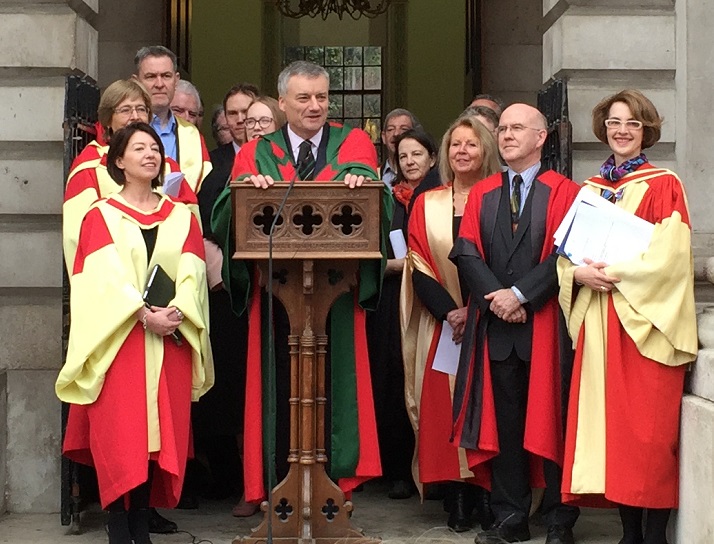
Honorary Fellowship
IN ACCORDANCE WITH THE PROVISION IN SECTION 11 OF THE CHAPTER ON THE FELLOWS IN THE 2010 CONSOLIDATED STATUTES, THE FOLLOWING HAVE BEEN ELECTED TO HONORARY FELLOWSHIP:
William C. Campbell (Professor)
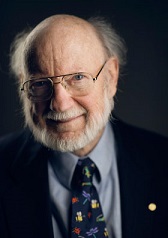
Born in Co. Donegal, William C. Campbell graduated from Trinity in 1952 with first class honours in Zoology.
Professor Campbell, with Satoshi Ōmura, was awarded the Nobel Prize in Physiology or Medicine 2015 "for their discoveries concerning a novel therapy against infections caused by roundworm parasites". A number of serious infectious diseases are caused by parasites spread by insects. River blindness is caused by a tiny worm that can infect the cornea and cause blindness. Lymphatic filariasis, or elephantiasis, is also caused by a worm and produces chronic swelling. Satoshi Ōmura cultured bacteria, which produce substances that inhibit the growth of other microorganisms. In 1978 he succeeded in culturing a strain from which William Campbell purified a substance, avermectin, which in a chemically modified form, ivermectin, proved effective against river blindness and elephantiasis.
As Director of Parasitology at Merck, in 1987, Professor Campbell spearheaded the decision by Merck to distribute Ivermectin free to millions of people in what became one of the first and foremost examples of a public/private partnership in international health. Annually 25 million people are treated under this scheme preventing new cases of river blindness. He was elected to the US National Academy of Science in 2002 and was awarded the American Society of Parasitology Distinguished Service Award in 2008.
Louise Richardson (Professor)
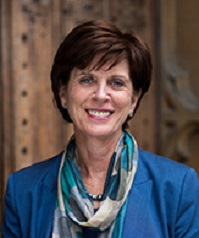
Professor Louise Richardson graduated with a B.A. in History from Trinity College, Dublin, an M.A. in Political Science from U.C.L.A., and an M.A. and Ph.D. in Government from Harvard.
Professor Richardson was Assistant and Associate Professor in the Harvard Government Department 1989-2001 and her commitment to teaching in Harvard won her both the Levenson Prize and the Abramson Prize. She also served as Executive Dean of the Radcliffe Institute for Advanced Study at Harvard 2001-2008 where she was instrumental in its transformation into an interdisciplinary centre promoting scholarship across academic fields and the creative arts.
Professor Richardson's research specialises in international security with an emphasis on terrorist movements. Her work has won numerous awards including the Sumner Prize for work towards the prevention of war and the establishment of universal peace. She has written widely on international terrorism, British foreign and defence policy, security institutions, and international relations. Her publications include Democracy and Counterterrorism: Lessons from the Past (2007), What Terrorists Want: Understanding the Enemy, Containing the Threat (2006), The Roots of Terrorism (2006), and When Allies Differ (1996).
Professor Richardson maintains a strong connection with Ireland and Trinity College Dublin, the University of Dublin. She received the Trinity College Dublin Alumni Award in 2009.
She was elected a Fellow of the Royal Society of Edinburgh in 2010 and was appointed to the Scottish Government's Council of Economic Advisers the following year. Professor Richardson became an Honorary Member of the Royal Irish Academy in 2015 and holds a number of honorary doctorates from institutions around the world; the Moscow State Institute of International Relations, MGIMO, the University of Aberdeen and Queen's University Belfast. She serves on the boards of a number of non-profit groups including the Carnegie Corporation and the Booker Prize Foundation.
Professor Louise Richardson became Vice-Chancellor of the University of Oxford on 1 January 2016, following seven years as Principal and Vice-Chancellor of the University of St. Andrews, Scotland.
Professorial Fellowship
IN ACCORDANCE WITH THE PROVISION IN SECTION 7 OF THE CHAPTER ON THE FELLOWS IN THE 2010 CONSOLIDATED STATUTES, THE FOLLOWING HAVE BEEN ELECTED TO PROFESSORIAL FELLOWSHIP:
- Jane Alden (Prof)
- Mark Bell (Prof)
- Yvonne Buckley (Prof)
- Andrew Burke (Prof)
- Seamas Donnelly (Prof)
- Siobhan Garrigan (Prof)
- Richard Layte (Prof)
- Douglas Leith (Prof)
- Christopher Morash (Prof)
- Luiz DaSilva (Prof)
Jane Alden (Professor)
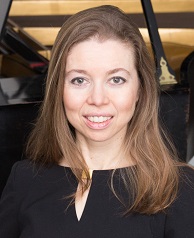
Professor Jane Alden is Professor of Music at Trinity College Dublin. Her research addresses musical notation and visual culture in the medieval and modern eras, language and translation, experimental music, and public engagement. Her publications include Songs, Scribes, and Society: The History and Reception of the Loire Valley Chansonniers (Oxford University Press, 2010) and various articles on medieval and contemporary topics. She is currently writing a book on the Scratch Orchestra and participatory music-making in London. With degrees from Manchester University, King's College, London, and the University of North Carolina at Chapel Hill, she is active as a singer and conductor, seeing performance as the most effective way to reach out beyond academia to communicate with the wider public. In 2011, she formed the Vocal Constructivists, a group of singers who specialize in performing graphic and text scores.
Mark Bell (Professor)
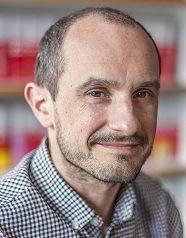
Mark Bell was appointed as Regius Professor of Laws in 2015. Prior to his appointment at Trinity, he was a professor at the School of Law, University of Leicester, where he was also Head of the School of Law (2011-2014).
Mark conducts research in the areas of Equality Law and Employment Law. He is the author of Racism and Equality in the European Union (OUP, 2008) and Anti-Discrimination Law and the European Union (OUP, 2002). He is a member of the Board of Directors of the Irish Centre for European Law; the committee of the Employment Law Association of Ireland; and the Berkeley Comparative Anti-Discrimination Law Study Group. In 2015, he was a Senior Expert on Disability for the European Commission's Network of Legal Experts in Gender Equality and Non-Discrimination. Since 2010, he has been working with the International Labour Organisation on several projects, including the preparation of a guide for employers on providing reasonable accommodation.
Yvonne Buckley (Professor)
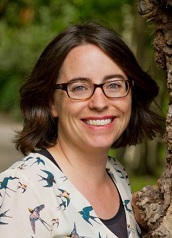
Professor Yvonne Buckley was appointed as Professor of Zoology in 2014. She is the co-champion of the multidisciplinary "Smart & Sustainable Planet" research theme and an international partner of the ARC Centre of Excellence for Environmental Decisions headquartered in Australia.
Prof. Buckley has research interests in determining the future of how we live well on the planet, environmental decision making, population ecology and quantitative ecology. Her research team seeks to understand the fundamental drivers of animal and plant population processes in a rapidly changing world and to provide support for environmental decisions in the areas of biodiversity conservation, invasive species management and habitat restoration.
Prof. Buckley is interested in the development of ecology as a discipline, she is the founding chair of the Irish Ecological Association, and serves on editorial boards for two top ecology journals. She is also active in mentoring women in higher education at all levels, including through the Aurora program.
Professor Buckley is originally from North Cork in Ireland and received a B.A in Biology (1st class) from Oxford University and a Ph.D. from Imperial College London (2002). She has worked at Imperial College London and the University of Queensland, Australia.
Andrew Burke (Professor)
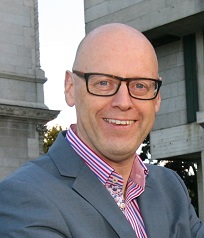
Professor Andrew Burke is Dean of Trinity Business School and the Chair of Business Studies. He is also Chairman of the London-based International think tank: The Centre for Research on Freelancing and Self-Employment (CSRE).
Previously he held the Bettany Chair of Entrepreneurship at Cranfield School of Management where he was founder and Director of the Centre for Entrepreneurship. He was a Visiting Professor at the Anderson School of Management, UCLA and a Research Professor at the Max Planck Institute for Economics, Germany.
He is widely published in top ranked international journals such as the Harvard Business Review, Journal of Management Studies and the Journal of Business Venturing. His work has been presented at the EU Commission, World Trade Organization, HM's Treasury, UK Houses of Commons and Lords as well as through media such as BBC's Breakfast Television and Working Lunch. He is a graduate of the University of Oxford, the London School of Economics and the NUI.
Seamas Donnelly (Professor)
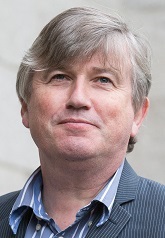
Appointed in 2015, Professor Seamas Donnelly is Professor of Clinical Medicine and Head of Medicine, based at the Trinity Centre for Health Sciences in Tallaght Hospital. He is a recognised international leader in Translational Medicine and his research epitomizes classical bench to bedside on an international stage.
A medical graduate of University College Galway (U.C.G.), he successfully competed previously for prestigious Wellcome Trust Fellowships at the University of Edinburgh and the Picower Institute in New York, an Institute affiliated to Rockefeller University. Returning to Ireland, he was one of the first clinicians to be awarded a Science Foundation Ireland (S.F.I.) Principal Investigator Programme grant award which was recently renewed.
He has been awarded an honorary Professorship by the University of Edinburgh for international leadership in Translational Medicine. He is the current Editor-in-Chief of the international medical journal the Quarterly Journal of Medicine.
Siobhán Garrigan (Professor)
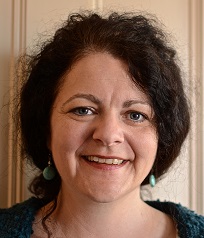
Professor Siobhán Garrigan is a feminist ecumenical theologian, and the first holder of the Loyola Chair of Catholic Theology at Trinity College Dublin.
Her research examines religious ritual to excavate theology's part in social and political difficulties, highlighting the ways that theology might also be a force for positive transformation in matters such as sectarianism, poverty and discrimination. Her most recent book is The Real Peace Process: Worship, Politics and the End of Sectarianism and recent articles include groundbreaking work on whiteness, homophobia and the use of flags in Northern Ireland. Her next book is a theological study of home and homelessness, and her current project is a theology of traditional Irish song.
Professor Garrigan's undergraduate teaching takes place at venues across the city of Dublin, opening up Christology to second-years through the paintings at the National Gallery, and immersing third-years in social justice projects to teach them the art of critical theological reflection on contemporary matters.
Richard Layte (Professor)
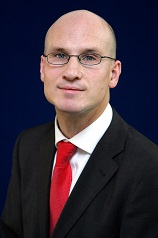
Professor Richard Layte was appointed Professor of Sociology at Trinity College Dublin in 2014.
He trained and subsequently worked at Nuffield College, the University of Oxford before moving to Ireland in 1998 to take up a position at the Economic and Social Research Institute (E.S.R.I.).
His work focuses on the structure of social and economic stratification and its impact on health and well-being. He has a particular interest in the mechanisms through which the social position of parents is transmitted to their children and, as part of this, studies how the social and economic resources of families shape the developmental trajectory of children. This work is based on analysis of large-scale cohort studies such as the Growing Up in Ireland Study which is following 20,000 children through time from 9 months of age. He is also involved in the governance and research programme of the Irish Longitudinal Study of Ageing (T.I.L.D.A.).
Douglas Leith (Professor)
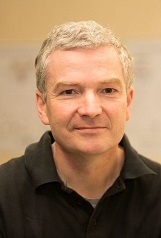
Professor Doug Leith is Professor of Computer Systems within the School of Computer Science and Statistics at Trinity College Dublin. He was appointed in 2014.
Doug Leith graduated from the University of Glasgow in 1986 and was awarded his PhD, also from the University of Glasgow, in 1989. Following a period at the University of Strathclyde as Senior Lecturer/Royal Society University Research Fellow, Professor Leith moved to the National University of Ireland, Maynooth in 2001 to establish the Hamilton Institute, an applied mathematics research institute of which he was founding Director.
His current research interests include wireless networks, network congestion control, distributed optimisation, scalable algorithms and data privacy.
Christopher Morash (Professor)
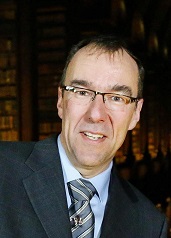
Chris Morash was appointed as the inaugural Seamus Heaney Professor of Irish Writing in the School of English in January, 2014.
A graduate of Trinity College Dublin (M.Phil. in Irish Writing, 1986; Ph.D. 1990) and Dalhousie University, in Canada (B.A. 1985), he worked for many years in Maynooth University, where he founded and was first Director of the Centre for Media Studies (2003-7), and was Professor of English (2007-2013).
His research ranges across Irish cultural studies, and his books include Writing the Irish Famine (Oxford, 1995), A History of the Theatre in Ireland, 1601-2000 (Cambridge, 2002), A History of the Irish Media (Cambridge, 2010), and, most recently, Mapping Irish Theatre (with Shaun Richards; Cambridge, 2013). He chaired the Compliance Committee of the Broadcasting Authority of Ireland (2009-2015), and has been a Member of the Royal Irish Academy since 2007. He lives in Meath with his wife and three children.
Luiz DaSilva (Professor)
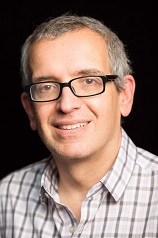
Professor Luiz A. DaSilva was appointed to the Personal Chair of Telecommunications in 2014.
He is a co-principal investigator of CONNECT, a telecommunications centre funded by the Science Foundation Ireland. Prior to joining TCD, Professor DaSilva was a tenured professor in the Bradley Department of Electrical and Computer Engineering at Virginia Tech.
His research focuses on distributed and adaptive resource management in wireless networks, and in particular radio resource sharing and the application of game theory to wireless networks. Professor DaSilva is a principal investigator on research projects funded by the National Science Foundation, the Science Foundation Ireland, and the European Commission. Prof DaSilva is an I.E.E.E. Communications Society Distinguished Lecturer. He is also a Fellow of the I.E.E.E., for contributions to cognitive networks and to resource management in wireless networks.
Fellowship
IN ACCORDANCE WITH THE PROVISION IN SECTION 7 OF THE CHAPTER ON THE FELLOWS IN THE 2010 CONSOLIDATED STATUTES,THE FOLLOWING HAVE BEEN ELECTED TO FELLOWSHIP:
- Mary Bourke (Dr)
- Christine Casey (Dr)
- Aiden Corvin (Dr)
- Gessica De Angelis (Dr)
- Paul Delaney (Dr)
- Ian Donohue (Dr)
- Vladimir Dotsenko (Dr)
- Juan Pablo Labrador (Dr)
- Eoin MacCárthaigh (Dr)
- Caoimhín MacMaoláin (Dr)
- Rachel McLoughlin (Dr)
- William Phelan (Dr)
- Eoin Scanlan (Dr)
- Roger West (Dr)
Mary Bourke (Dr)
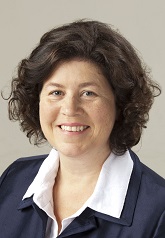
Dr Bourke is an Earth and Planetary Geomorphologist with expertise in extreme environments on Earth and Mars. She has published over 50 manuscripts on landscapes in Antarctica, Australia, Namibia, Mars and Ireland. She is the Chair of the International Association of Geomorphologist's Working Group on Planetary Geomorphology; President of the Irish Geomorphology Group and serves on editorial advisory panels for the Journal of Aeolian Research, Earth Surface Processes and Landforms and the Journal of Earth Surface dynamics.
She received her B.A. and M.A. in Geography from University College Dublin. She undertook her Ph.D. at the Australian National University investigating catastrophic floods in the Central Australian deserts, for which she received the university prize for outstanding postgraduate research in Earth Sciences. In 1998 she moved to the Smithsonian Institution for a Post-Doctoral position studying Martian landscapes. She then took up an academic post in the School of Geography, University of Oxford followed by a Senior Scientist position at the Planetary Science Institute, Arizona where she worked with NASA for nine years until her return to Ireland in 2012.
Christine Casey (Dr)
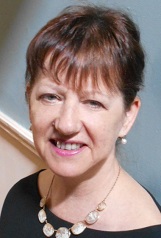
Dr Christine Casey is Associate Professor in Architectural History and Head of the Department of History of Art and Architecture.
She has published widely on Irish architecture and is author of the definitive research work on the architecture of Dublin city published by Yale University Press in 2005. An honorary member of the Royal Institute of the Architects of Ireland, she has served as a board and committee member on several national organisations for architectural heritage including the Heritage Council, the Irish Architectural Archive, the Irish Georgian Society and the Castletown Foundation.
Dr Casey has published books and articles on national and regional architecture and has recently completed a study of architecture and plasterwork decoration in early-modern Europe, Britain and Ireland which will be published by Yale University Press in Spring 2017.
Aiden Corvin (Professor)
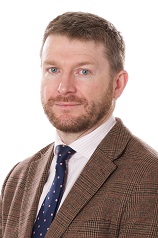
Professor Aiden Corvin is Professor in Psychiatry at Trinity College Dublin and a Consultant Psychiatrist at StJames's Hospital, Dublin. He is currently Head of the Discipline of Psychiatry at the School of Medicine.
Professor Corvin graduated from University College Cork and trained in Dublin before completing a Wellcome Trust Training Fellowship at Trinity College Dublin. He leads the Psychosis Research Group, a multidisciplinary team dedicated to understanding the genetics of schizophrenia and bipolar disorder. Their work is delivering fresh insights into the genes and molecular pathways that contribute to risk. This work has been funded by Science Foundation Ireland, The Wellcome Trust and the National Institute of Health (N.I.H.).
Prof. Corvin is a founder member of the International Schizophrenia Consortium and the Welcome Trust Case Control Consortium 2 (W.T.C.C.C.2) and is a lead-PI with the Psychiatric Genomics Consortium (P.G.C.). He is the Associate Editor for Genetics with the Schizophrenia Bulletin and a Neuroscience Panel Member for the Medical Research Council (U.K.). He is a Thompson Reuters Most Cited Scientist.
Gessica De Angelis (Dr)
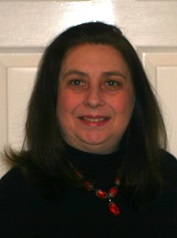
Dr Gessica De Angelis is an applied linguist in the School of Linguistic, Speech and Communication Sciences. She obtained her Ph.D. in 2002 from Birkbeck College, University of London, U.K.. She lectured in Italy, England, U.S.A. and Canada prior to joining the School in 2012.
Dr De Angelis' main research interests are in multilingualism and language learning, with special emphasis on how multilinguals acquire languages beyond the L2 and the role of prior non-native language knowledge during learning. Her work is also concerned with multilingualism in educational contexts and multilingual language development in children. She is the author of Third or Additional Language Acquisition (2007) and co-editor of Crosslinguistic influence and crosslinguistic interaction in multilingual language learning (2015), Teaching and learning in multilingual contexts: sociolinguistic and educational perspectives (2014) and New Trends in Crosslinguistic Influence and Multilingualism Research (2011).
Dr De Angelis has been a member of the Board of the International Association of Multilingualism since 2004 and served as Vice-President from 2009 to 2014.
Paul Delaney (Dr)
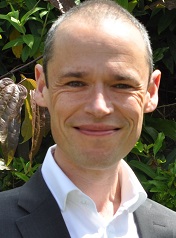
Paul Delaney is a Lecturer in Irish Writing in the School of English. He received B.A. and M.Litt. degrees in English from Trinity College Dublin, and holds a Ph.D. from the University of Kent (Canterbury), where he was a Chevening scholar.
Dr Delaney's publications include the critically-acclaimed monograph Seán O'Faoláin: Literature, Inheritance and the 1930s (2014), and the edited collections Reading Colm Tóibín (2008) and William Trevor: Revaluations (2013), with Michael Parker. He is also the author of numerous essays, articles and reviews on twentieth-century and contemporary Irish literature. Current projects include The Edinburgh Companion to the Short Story in English, with Adrian Hunter (due 2017), as well as a monograph on the processes of life writing in the Irish Free State.
Dr Delaney has been a College Tutor since 2006, and he was awarded a Provost's Teaching Award in 2012.
Ian Donohue (Dr)
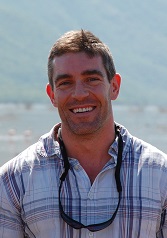
Dr Ian Donohue is an Assistant Professor in the School of Natural Sciences.
Dr Donohue is an ecologist whose research explores the stability of biological networks. The overarching aim of his research is to further understanding of how key elements of global change alter the functioning and stability of ecosystems. To achieve this, he collaborates broadly; with engineers, geneticists, economists, social and computer scientists and his research incorporates theoretical, experimental and applied perspectives. With his research team he is exploring how the loss of biodiversity alters the capacity of ecosystems to resist and recover from disturbances, how parasites will influence the stability of ecosystems in a warming world, and how to optimise the multidimensional stability of complex dynamic networks such as ecosystems and economies.
Vladimir Dotsenko (Dr)
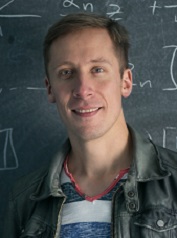
Vladimir Dotsenko is an Assistant Professor in the School of Mathematics. Previously, he was a research fellow at the Dublin Institute of Advanced Studies and at the University of Luxembourg, and shorter visiting positions as professor at University Lyon 1, research fellow at the Newton Institute for Mathematical Sciences (Cambridge) and at the Max-Planck Institute for Mathematics (Bonn).
His main research area is homotopical algebra. He introduced the concept of Gröbner bases for operads, which he, together with Griffin and Khoroshkin, utilised to prove results in operad theory, algebraic topology, and combinatorics. A definitive exposition of that work is presented in the book Algebraic Operads: An Algorithmic Companion which he completed jointly with Bremner.
Together with Shadrin and Vallette, he recently came up with a non-commutative version of the notion of a cohomological field theory, a structure behind a few objects of interest for algebraic geometry and mathematical physics. He is a member of the editorial board of a peer-reviewed journal Higher Structures.
Juan Pablo Labrador (Dr)
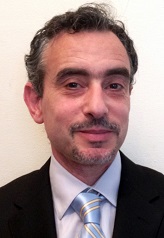
Dr. Juan Pablo Labrador is an Assistant Professor in the Department of Genetics, School of Genetics and Microbiology.
He graduated from Universidad Autónoma de Madrid, (Spain), carried out his Ph.D. at the European Molecular Biology Laboratory (E.M.B.L., Heidelberg, Germany) and postdoctoral work at Howard Hughes Medical Institute, U.C. Berkeley and University of Pennsylvania (U.PENN.) School of Medicine (U.S.A.). Since joining Trinity College Dublin in 2006, his work has focused on understanding how individual cells are programmed to control their migration or guidance and establish specific connections in the nervous system.
He has been fellow of the Human Frontiers Science Program and received numerous awards including the Juan Abelló I prize from the Spanish Royal Academy of Doctors.
Eoin MacCárthaigh (Dr)
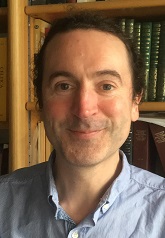
Dr Eoin MacCárthaigh lectures in the Department of Irish, in the School of Languages, Literatures and Cultural Studies.
He is a graduate of Trinity College Dublin, the University of Dublin, having completed his Ph.D. here. He researches the language and metre of dán díreach ('bardic poetry'), which dominated the Irish literary landscape for at least four centuries (c. 1200–1600).
He is the author of The Art of Bardic Poetry (Dublin Institute for Advanced Studies, 2014), an edition of one of the most important and most challenging texts from the period.
Caoimhín MacMaoláin (Dr)
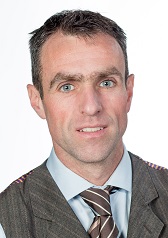
Dr Caoimhín MacMaoláin is an Associate Professor in the School of Law. He is a graduate of U.C.D (B.C.L., LL.M.) and D.C.U. (Ph.D.). He previously lectured at the University of Northampton and held a Jean Monnet Chair in E.U. Integration at the University of Exeter.
His research focuses on the way in which the production and sale of food is regulated by E.U. and International Law. He has written two books on this subject, both published by Hart. He is currently researching and writing a third book, which is specifically on Irish Food Law. He has also published a number of book chapters and articles in the leading international journals in the field, including the European Law Review, the Common Market Law Review, the European Journal of Consumer Law, European Public Law and the Food and Drug Law Journal.
He has served as the Convenor for Ireland for the Society of Legal Scholars since 2006.
Rachel McLoughlin (Dr)
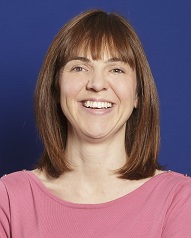
Dr Rachel McLoughlin was appointed as Ussher Assistant Professor in Immunology in 2011. She was awarded the Wellcome Trust Career Development Fellowship in 2010, which facilitated a move to Trinity and the establishment of the Host Pathogen Interactions Group within the School of Biochemistry and Immunology.
Dr McLoughlin graduated from University College Dublin with a degree in Pharmacology and obtained her Ph.D. from the University of Wales School of Medicine, Cardiff, U.K.. She undertook postdoctoral training at the School of Biosciences, Cardiff University and Brigham and Women's Hospital, Boston, U.S.A. before obtaining a faculty position as Assistant Professor in Medicine at Harvard Medical School.
Dr McLoughlin's research is focused on understanding the immune response to bacterial infection, with a particular focus on the development of novel immunological therapies to combat infection with the bacterium Staphylococcus aureus, for which antibiotic resistance is a major global problem. Dr McLoughlin has published extensively in this field and her research has made a significant global impact. She has raised ˜€2 million in research funding since 2010, from national (Science Foundation Ireland, Health Research Board, Irish Research Council) and international (The Wellcome Trust, Marie Curie Actions) funding agencies to support her research program.
William Phelan (Dr)
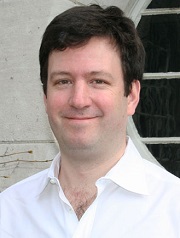
Dr William Phelan joined Trinity College Dublin in 2007 from Middlebury College, Vermont, after completing a Ph.D. in Government at Harvard University. His research focusses on the politics of the European Court of Justice. His recent book, In Place of Inter-State Retaliation, which appeared with Oxford in 2015, argues that the special role of individuals – citizens and businesses – in the enforcement of EU law must be understood as a contribution to inter-state politics, because it allows the EU member states to give up enforcement through retaliatory trade sanctions or similarly disruptive countermeasures.
At Trinity, Dr Phelan regularly teaches the large undergraduate module on International Relations and enjoys the 'first contact' of many of these students with the study of international politics. He also established and directed Trinity's successful M.Sc. in International Politics from 2011 to 2014, which offers students an intensive research-led education on a variety of topics in contemporary world politics.
Eoin Scanlan (Dr)
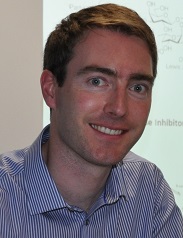
Eoin Scanlan is Assistant Professor of Organic and Medicinal Chemistry in the School of Chemistry, where he is also the Director of the Moderatorship in Medicinal Chemistry.
He is a graduate of the National University of Ireland, Galway and received his Ph.D. in 2004 from the University of St. Andrews, U.K. He worked as a postdoctoral research fellow at the University of Bern, Switzerland and also at The University of Oxford, U.K.
Since his academic appointment to Trinity College Dublin in 2008, he has developed an active independent research programme in medicinal chemistry and glycoscience. His research group applies a strong synthetic and interdisciplinary approach towards addressing complex biological problems relevant to human health and to industry. He is author of more than 40 peer-reviewed research articles in high-impact journals. He has secured research funding from Science Foundation Ireland, Enterprise Ireland, The Irish Research Council and direct industry funding.
Roger West (Dr)
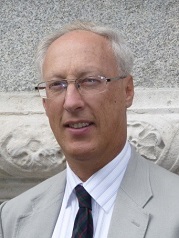
Dr Roger West is an Associate Professor in the Department of Civil, Structural and Environmental Engineering, which he joined in 1985. He is a graduate of Trinity College Dublin and Imperial College London. He is Director of the Structural Laboratories in Trinity, a Chartered Structural Engineer and a Fellow of the Institution of Engineers of Ireland.
His research is primarily in construction innovation and sustainability, particularly in concrete technology, specialising in aspects of lean construction and he is Chair of the Irish Concrete Durability Committee. He has delivered more than a dozen keynote papers on concrete innovations on four continents. He is a founder member of the Ireland-Indian Concrete Research Initiative and has on-going research and exchange links with four Indian academic institutions, including the recently announced twinning programme with Thapar University in Punjab.
Dr West was awarded one of Trinity's inaugural Global Engagement Awards in 2015.
Scholarship
THE FOLLOWING HAVE BEEN ELECTED TO SCHOLARSHIP 2016:
| Department | Name |
|
|---|---|---|
| Business Studies and a Language | Arthaud Mesnard |
|
| Children's and General Nursing | Sarah Margaret Mather |
|
| Computer Science | Sarah Sharkey Dário Tavares Antunes Luke Egan Daniel Crawford |
|
| Deaf Studies | Abbie O'Neill | |
| Economic and Social Studies | Simon Curran Séamus O'Malley Anna Katariina Kylkilahti Peter Wilson |
|
| Engineering | Patrick Sullivan Cian Weldon |
|
| History | Clare Parkhouse Jack Cato Dykstra-McCarthy |
|
| History and Political Science | Samuel Michael Browne | |
| Law | Blánaid ní Bhraonáin | |
| Law and Business | Cian Henry | |
| Law and French | Alan Eustace |
|
| Law and Political Science | Christopher McMahon | |
| Management Science & Information Systems Studies | Rachel Margaret Henry | |
| Mathematics | Samuel McKeown | |
| Medicine | Conor Browne Talulla Mac Dunne Jack Hartnett Eleanor Gallagher Mark Nolan |
|
| Midwifery | Aoife Swan | |
| Nursing | Jheyzybelle Joy Layao Julia Linden |
|
| Pharmacy | Sarah Fitzpatrick |
|
| Philosophy, Political Science, Economics and Sociology | Sophie Donnelly | |
| Physiotherapy | Maggie Grace O'Donovan | |
| Psychology | Gabriele Gusciute |
|
| Science | Aoife Gregg Eoin James Farrell Simon Benson Jessica Foley Áine Kennedy Diarmaid Kelly |
|
| Social Studies | Ailish Mitchell Clodagh O'Connor |
|
| Sociology and Social Policy | Philomena Murphy | |
| Two Subject Moderatorship | English Literature & History | Eva De Bhal Orlaith Marie Darling |
| Drama Studies & English Literature | William Dunleavy |
|